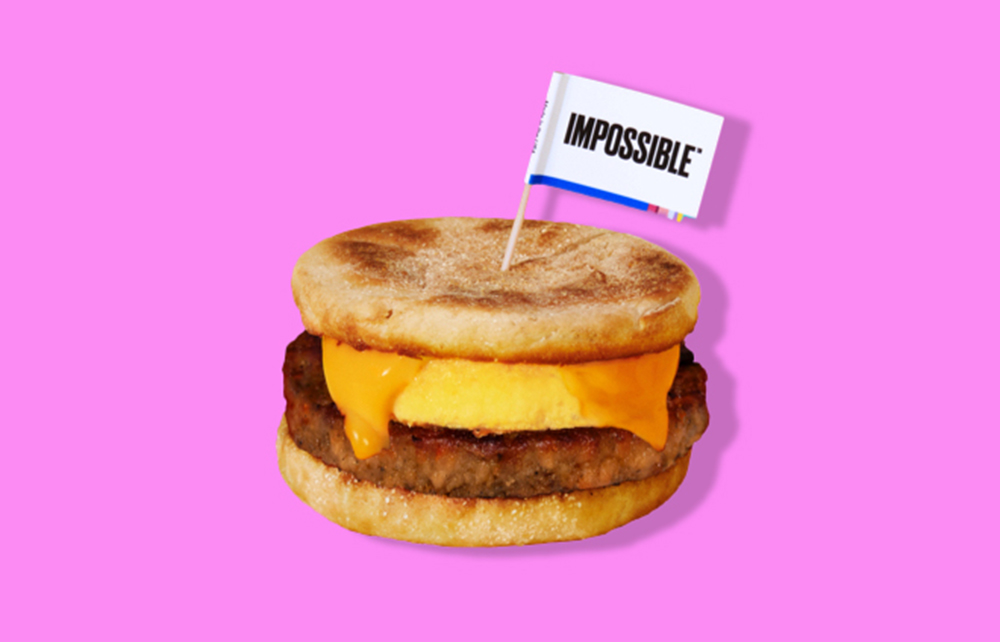漢堡肉餅一直是植物人造肉公司的主要目標(biāo)。
仿制漢堡肉餅比仿制西冷牛排或者排骨更容易,因?yàn)闈h堡肉餅本身就是用碎肉制成的;消費(fèi)者對加工肉類的健康問題的擔(dān)憂主要就是來自這種食物;而且它是典型的美式食物。
但現(xiàn)在食品科技初創(chuàng)公司把業(yè)務(wù)擴(kuò)展到了幾乎同樣具有這三個(gè)特征的肉類產(chǎn)品:香腸。

周一,位于硅谷的Impossible Foods通過Dot Foods、西斯科公司和US Foods等經(jīng)銷商,向全美的餐廳推出了人造肉香腸肉餅。1月,該產(chǎn)品開始在部分漢堡王餐廳推出,本月早些時(shí)候,星巴克開始力推一款I(lǐng)mpossible Sausage早餐三明治。
Impossible Foods的CEO戴維?李告訴《財(cái)富》雜志:“我們的業(yè)務(wù)從來不局限于漢堡肉餅。我們的計(jì)劃是涉足整個(gè)肉類行業(yè)的絕大多數(shù)領(lǐng)域。”
Impossible Sausage推出至今已有六個(gè)月時(shí)間。目前,該產(chǎn)品在2萬多家餐廳銷售,包括星巴克和漢堡王等早期合作伙伴,以及Yelp上評價(jià)最高的30家美國餐廳。李說:“這是公司史上一個(gè)重要的里程碑。我們可以證明,Impossible的目標(biāo)市場不止是漢堡肉餅。”
Impossible Burger讓公司順利進(jìn)軍午餐和晚餐市場,Impossible Sausage則讓其向早餐市場邁進(jìn)了一步。
Impossible Foods及其在食品科技行業(yè)的競爭對手都致力于取代傳統(tǒng)肉類行業(yè),努力提供與真肉口感和營養(yǎng)成分類似、基于植物的人造肉,希望能吸引非常愛吃肉的消費(fèi)者。消費(fèi)者越來越認(rèn)識到肉對身體健康和環(huán)境的影響,這種趨勢給這些初創(chuàng)公司帶來了發(fā)展動力。在最近的新聞稿中,Impossible Foods抓住時(shí)機(jī)兜售人造肉的另一個(gè)好處。該公司表示:“改變吃動物制品的習(xí)慣,是減少未來從動物到人傳播傳染病的最佳方式之一。”
李指出,新冠疫情只是凸顯出了肉類行業(yè)給消費(fèi)者帶來的挑戰(zhàn)。他說:“在新冠疫情爆發(fā)之前,愛吃肉的消費(fèi)者一直拒絕放棄吃動物肉,”但如今關(guān)于肉類加工廠無法控制新冠疫情的報(bào)道,擺在了消費(fèi)者面前。
Impossible Sausage是自2016年的漢堡肉餅以來該公司推出的第一款新產(chǎn)品,在此之前,其最大的競爭對手Beyond Meat在去年晚些時(shí)候推出了一款香腸肉餅。Beyond Meat在2017年開始推出整段香腸產(chǎn)品。
Impossible Foods在3月完成了一輪5億美元融資,到目前為止總?cè)谫Y額達(dá)到13億美元。李表示,此輪融資將用于繼續(xù)進(jìn)行全球擴(kuò)張和產(chǎn)品研發(fā)。(財(cái)富中文網(wǎng))
翻譯:劉進(jìn)龍
審校:汪皓
漢堡肉餅一直是植物人造肉公司的主要目標(biāo)。
仿制漢堡肉餅比仿制西冷牛排或者排骨更容易,因?yàn)闈h堡肉餅本身就是用碎肉制成的;消費(fèi)者對加工肉類的健康問題的擔(dān)憂主要就是來自這種食物;而且它是典型的美式食物。
但現(xiàn)在食品科技初創(chuàng)公司把業(yè)務(wù)擴(kuò)展到了幾乎同樣具有這三個(gè)特征的肉類產(chǎn)品:香腸。
周一,位于硅谷的Impossible Foods通過Dot Foods、西斯科公司和US Foods等經(jīng)銷商,向全美的餐廳推出了人造肉香腸肉餅。1月,該產(chǎn)品開始在部分漢堡王餐廳推出,本月早些時(shí)候,星巴克開始力推一款I(lǐng)mpossible Sausage早餐三明治。
Impossible Foods的CEO戴維?李告訴《財(cái)富》雜志:“我們的業(yè)務(wù)從來不局限于漢堡肉餅。我們的計(jì)劃是涉足整個(gè)肉類行業(yè)的絕大多數(shù)領(lǐng)域。”
Impossible Sausage推出至今已有六個(gè)月時(shí)間。目前,該產(chǎn)品在2萬多家餐廳銷售,包括星巴克和漢堡王等早期合作伙伴,以及Yelp上評價(jià)最高的30家美國餐廳。李說:“這是公司史上一個(gè)重要的里程碑。我們可以證明,Impossible的目標(biāo)市場不止是漢堡肉餅。”
Impossible Burger讓公司順利進(jìn)軍午餐和晚餐市場,Impossible Sausage則讓其向早餐市場邁進(jìn)了一步。
Impossible Foods及其在食品科技行業(yè)的競爭對手都致力于取代傳統(tǒng)肉類行業(yè),努力提供與真肉口感和營養(yǎng)成分類似、基于植物的人造肉,希望能吸引非常愛吃肉的消費(fèi)者。消費(fèi)者越來越認(rèn)識到肉對身體健康和環(huán)境的影響,這種趨勢給這些初創(chuàng)公司帶來了發(fā)展動力。在最近的新聞稿中,Impossible Foods抓住時(shí)機(jī)兜售人造肉的另一個(gè)好處。該公司表示:“改變吃動物制品的習(xí)慣,是減少未來從動物到人傳播傳染病的最佳方式之一。”
李指出,新冠疫情只是凸顯出了肉類行業(yè)給消費(fèi)者帶來的挑戰(zhàn)。他說:“在新冠疫情爆發(fā)之前,愛吃肉的消費(fèi)者一直拒絕放棄吃動物肉,”但如今關(guān)于肉類加工廠無法控制新冠疫情的報(bào)道,擺在了消費(fèi)者面前。
Impossible Sausage是自2016年的漢堡肉餅以來該公司推出的第一款新產(chǎn)品,在此之前,其最大的競爭對手Beyond Meat在去年晚些時(shí)候推出了一款香腸肉餅。Beyond Meat在2017年開始推出整段香腸產(chǎn)品。
Impossible Foods在3月完成了一輪5億美元融資,到目前為止總?cè)谫Y額達(dá)到13億美元。李表示,此輪融資將用于繼續(xù)進(jìn)行全球擴(kuò)張和產(chǎn)品研發(fā)。(財(cái)富中文網(wǎng))
翻譯:劉進(jìn)龍
審校:汪皓
The burger has long been a prime target of plant-based meat companies.
It’s easier to mimic than a sirloin or a chop since it’s ground meat; the burger gets right to the heart of consumers’ health concerns over processed meat; and it’s pure Americana.
But now food-tech startups have expanded to a new type of meat that hits on a similar trifecta: sausages.
On Monday, Silicon Valley–based Impossible Foods made its plant-based sausage patty available to all restaurants in the U.S. through distributors including Dot Foods, Sysco, and US Foods. The move follows the product’s January debut in select Burger Kings, and the broad rollout earlier this month of an Impossible Sausage breakfast sandwich at Starbucks.
“It was never just about the burger,” Impossible Foods CFO David Lee told Fortune. “We intend to be a very large part of the entire meat industry.”
Six months after launching, Impossible Sausage is now available in more than 20,000 restaurant locations, including early partners Starbucks and Burger King, as well as 30 of the nation’s top-rated diners via Yelp. “It’s a major milestone for the company,” says Lee. “The addressable market that we can demonstrate for Impossible is clearly way beyond a burger.”
While the Impossible Burger had primarily enabled the company to get into the lunch and dinner market, the launch of Impossible Sausage allows the company to make advances at breakfast.
Impossible Foods and its food-tech competitors are on a mission to displace the traditional meat industry by attempting to offer plant-based alternatives that taste and perform so similarly to the real thing that they entice even serious meat eaters. These startups have gained traction as consumers become increasingly aware of meat’s impact on their health and the environment. In its most recent release, the company also touted a new timely benefit, saying that “transitioning away from eating animal products is one of the best ways to reduce the likelihood of future animal to human pandemics.”
Lee noted that the coronavirus has only highlighted the challenges of the meat industry for consumers. “Meat eaters have long before this current crisis been in denial about the compromises they make when they choose to eat meat from an animal,” Lee says, noting that consumers are now being confronted with articles about meat processing plants struggling to curb cases of COVID-19.
Impossible Sausage is the first new product that the company has rolled out since the burger in 2016, and follows the launch of a sausage patty by its biggest competitor, Beyond Meat, late last year. Beyond Meat also started rolling out sausages in link form in 2017.
Impossible Foods closed a $500 million round of funding in March, bringing its total funding to $1.3 billion so far. Lee says the round is going toward continued global expansion and research and development.






